Legal, Ethical, and Professional Issues in Healthcare: A Case Study
VerifiedAdded on 2021/06/16
|9
|2362
|21
Case Study
AI Summary
This case study examines a breach of patient privacy involving a nurse, Sharni, who accessed and shared a patient's health information without consent. The assignment analyzes the legal, ethical, and professional implications of Sharni's actions, referencing relevant Australian laws, ethical codes, and professional guidelines. It explores violations of the Privacy Act 1988, ethical principles like non-maleficence and autonomy, and codes of ethics from the Australian Medical Association, the Code of Ethics for Nurses in Australia, and the ICN Code of Ethics for Nurses. Furthermore, it delves into professional conduct standards set by the Nursing and Midwifery Board of Australia (NMBA) and the Australian Health Practitioner Regulation Agency (AHPRA), particularly concerning informed consent and social media policies. The case study concludes that Sharni's actions constitute multiple breaches of privacy, ethical guidelines, and professional standards, emphasizing the importance of maintaining patient confidentiality and adhering to legal and ethical obligations in healthcare practice.
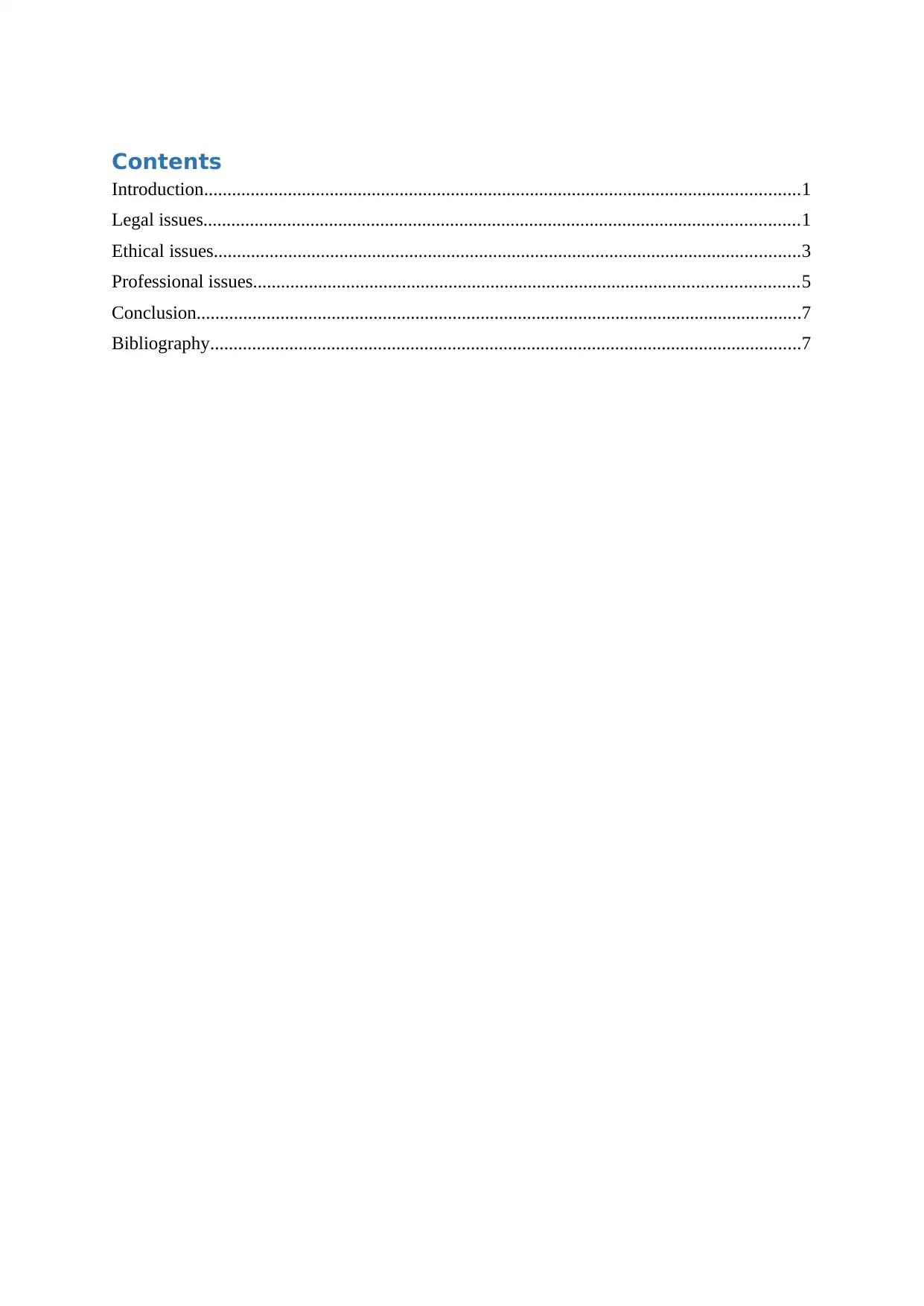
Contents
Introduction................................................................................................................................1
Legal issues................................................................................................................................1
Ethical issues..............................................................................................................................3
Professional issues.....................................................................................................................5
Conclusion..................................................................................................................................7
Bibliography...............................................................................................................................7
Introduction................................................................................................................................1
Legal issues................................................................................................................................1
Ethical issues..............................................................................................................................3
Professional issues.....................................................................................................................5
Conclusion..................................................................................................................................7
Bibliography...............................................................................................................................7
Paraphrase This Document
Need a fresh take? Get an instant paraphrase of this document with our AI Paraphraser
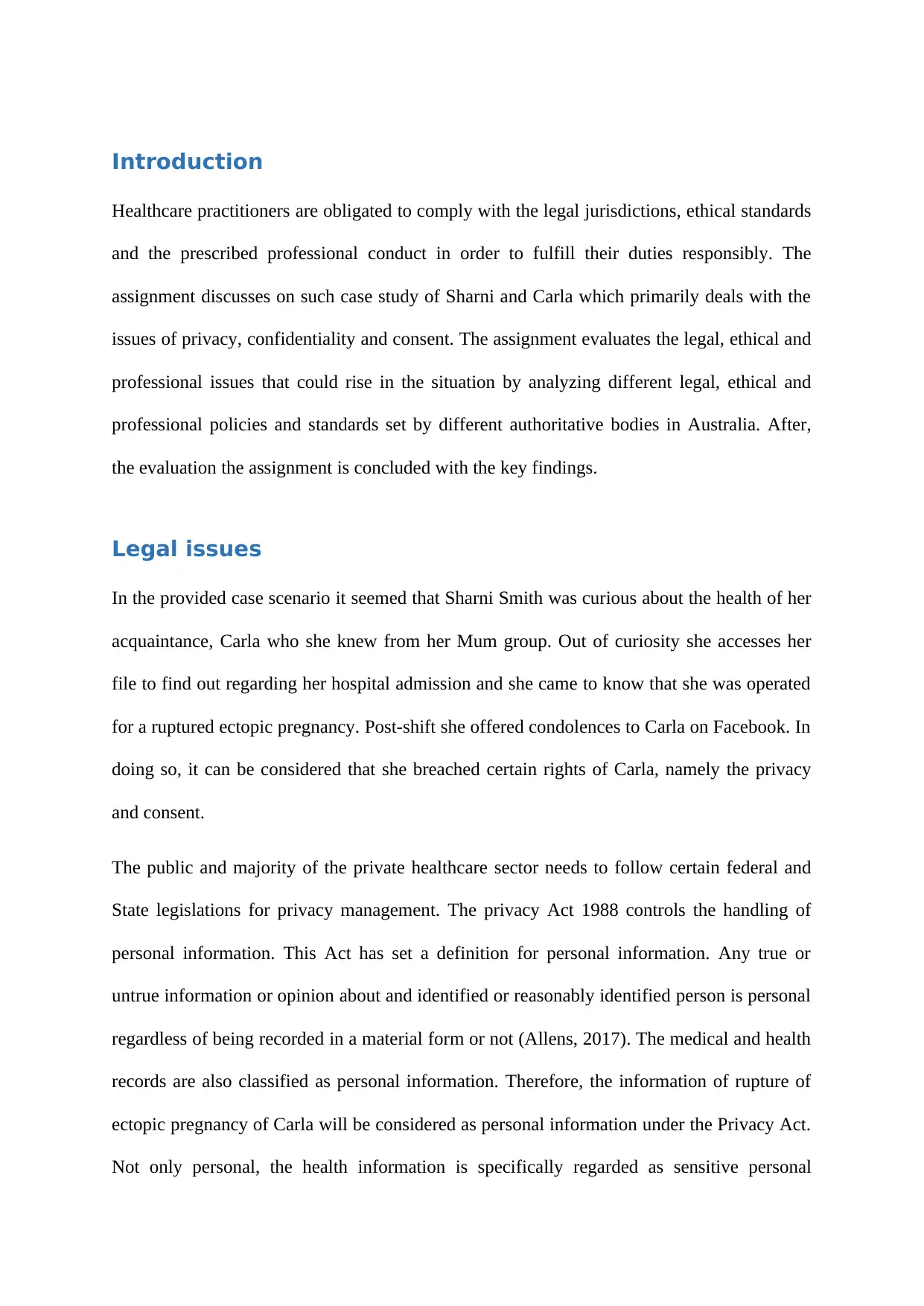
Introduction
Healthcare practitioners are obligated to comply with the legal jurisdictions, ethical standards
and the prescribed professional conduct in order to fulfill their duties responsibly. The
assignment discusses on such case study of Sharni and Carla which primarily deals with the
issues of privacy, confidentiality and consent. The assignment evaluates the legal, ethical and
professional issues that could rise in the situation by analyzing different legal, ethical and
professional policies and standards set by different authoritative bodies in Australia. After,
the evaluation the assignment is concluded with the key findings.
Legal issues
In the provided case scenario it seemed that Sharni Smith was curious about the health of her
acquaintance, Carla who she knew from her Mum group. Out of curiosity she accesses her
file to find out regarding her hospital admission and she came to know that she was operated
for a ruptured ectopic pregnancy. Post-shift she offered condolences to Carla on Facebook. In
doing so, it can be considered that she breached certain rights of Carla, namely the privacy
and consent.
The public and majority of the private healthcare sector needs to follow certain federal and
State legislations for privacy management. The privacy Act 1988 controls the handling of
personal information. This Act has set a definition for personal information. Any true or
untrue information or opinion about and identified or reasonably identified person is personal
regardless of being recorded in a material form or not (Allens, 2017). The medical and health
records are also classified as personal information. Therefore, the information of rupture of
ectopic pregnancy of Carla will be considered as personal information under the Privacy Act.
Not only personal, the health information is specifically regarded as sensitive personal
Healthcare practitioners are obligated to comply with the legal jurisdictions, ethical standards
and the prescribed professional conduct in order to fulfill their duties responsibly. The
assignment discusses on such case study of Sharni and Carla which primarily deals with the
issues of privacy, confidentiality and consent. The assignment evaluates the legal, ethical and
professional issues that could rise in the situation by analyzing different legal, ethical and
professional policies and standards set by different authoritative bodies in Australia. After,
the evaluation the assignment is concluded with the key findings.
Legal issues
In the provided case scenario it seemed that Sharni Smith was curious about the health of her
acquaintance, Carla who she knew from her Mum group. Out of curiosity she accesses her
file to find out regarding her hospital admission and she came to know that she was operated
for a ruptured ectopic pregnancy. Post-shift she offered condolences to Carla on Facebook. In
doing so, it can be considered that she breached certain rights of Carla, namely the privacy
and consent.
The public and majority of the private healthcare sector needs to follow certain federal and
State legislations for privacy management. The privacy Act 1988 controls the handling of
personal information. This Act has set a definition for personal information. Any true or
untrue information or opinion about and identified or reasonably identified person is personal
regardless of being recorded in a material form or not (Allens, 2017). The medical and health
records are also classified as personal information. Therefore, the information of rupture of
ectopic pregnancy of Carla will be considered as personal information under the Privacy Act.
Not only personal, the health information is specifically regarded as sensitive personal
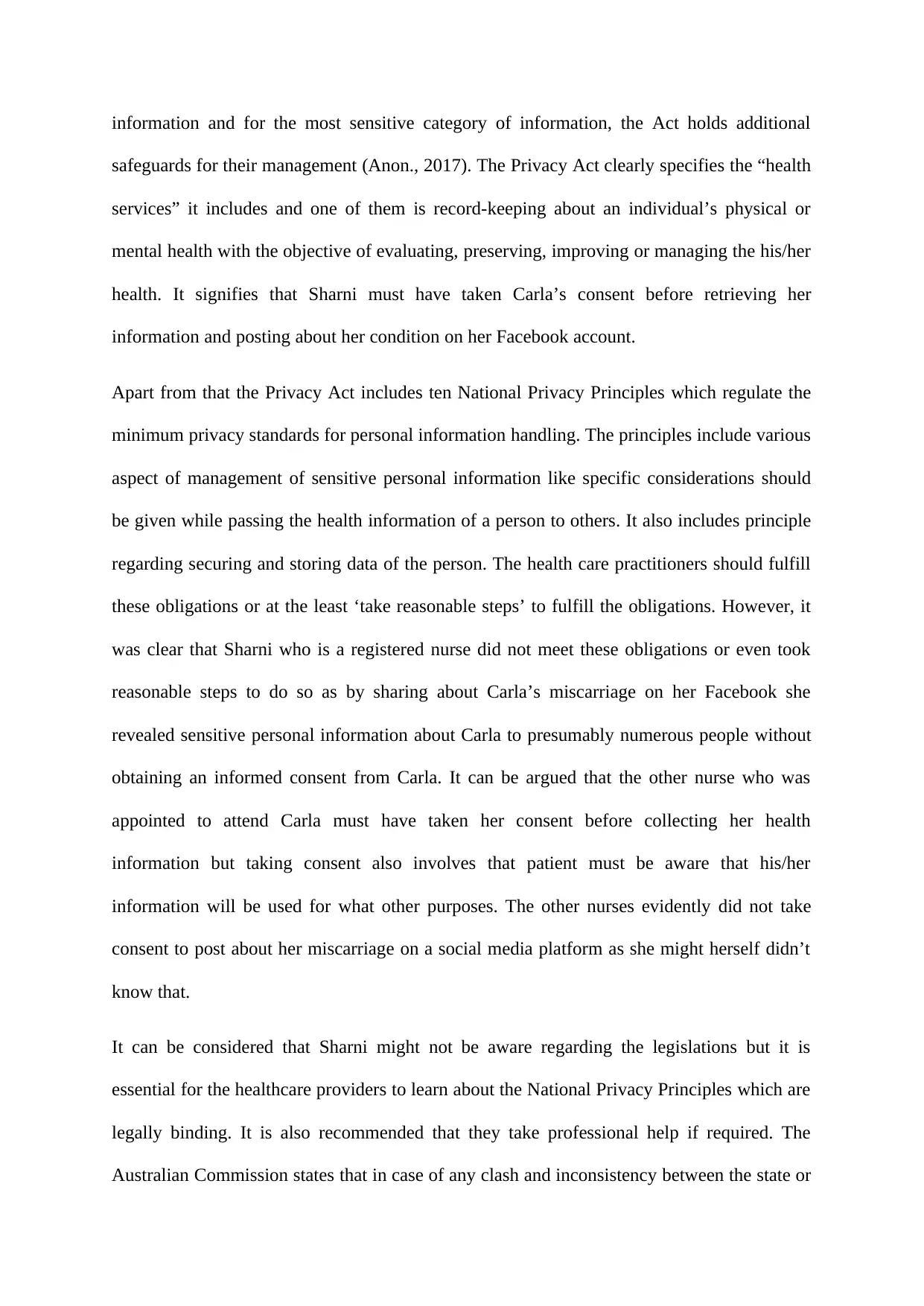
information and for the most sensitive category of information, the Act holds additional
safeguards for their management (Anon., 2017). The Privacy Act clearly specifies the “health
services” it includes and one of them is record-keeping about an individual’s physical or
mental health with the objective of evaluating, preserving, improving or managing the his/her
health. It signifies that Sharni must have taken Carla’s consent before retrieving her
information and posting about her condition on her Facebook account.
Apart from that the Privacy Act includes ten National Privacy Principles which regulate the
minimum privacy standards for personal information handling. The principles include various
aspect of management of sensitive personal information like specific considerations should
be given while passing the health information of a person to others. It also includes principle
regarding securing and storing data of the person. The health care practitioners should fulfill
these obligations or at the least ‘take reasonable steps’ to fulfill the obligations. However, it
was clear that Sharni who is a registered nurse did not meet these obligations or even took
reasonable steps to do so as by sharing about Carla’s miscarriage on her Facebook she
revealed sensitive personal information about Carla to presumably numerous people without
obtaining an informed consent from Carla. It can be argued that the other nurse who was
appointed to attend Carla must have taken her consent before collecting her health
information but taking consent also involves that patient must be aware that his/her
information will be used for what other purposes. The other nurses evidently did not take
consent to post about her miscarriage on a social media platform as she might herself didn’t
know that.
It can be considered that Sharni might not be aware regarding the legislations but it is
essential for the healthcare providers to learn about the National Privacy Principles which are
legally binding. It is also recommended that they take professional help if required. The
Australian Commission states that in case of any clash and inconsistency between the state or
safeguards for their management (Anon., 2017). The Privacy Act clearly specifies the “health
services” it includes and one of them is record-keeping about an individual’s physical or
mental health with the objective of evaluating, preserving, improving or managing the his/her
health. It signifies that Sharni must have taken Carla’s consent before retrieving her
information and posting about her condition on her Facebook account.
Apart from that the Privacy Act includes ten National Privacy Principles which regulate the
minimum privacy standards for personal information handling. The principles include various
aspect of management of sensitive personal information like specific considerations should
be given while passing the health information of a person to others. It also includes principle
regarding securing and storing data of the person. The health care practitioners should fulfill
these obligations or at the least ‘take reasonable steps’ to fulfill the obligations. However, it
was clear that Sharni who is a registered nurse did not meet these obligations or even took
reasonable steps to do so as by sharing about Carla’s miscarriage on her Facebook she
revealed sensitive personal information about Carla to presumably numerous people without
obtaining an informed consent from Carla. It can be argued that the other nurse who was
appointed to attend Carla must have taken her consent before collecting her health
information but taking consent also involves that patient must be aware that his/her
information will be used for what other purposes. The other nurses evidently did not take
consent to post about her miscarriage on a social media platform as she might herself didn’t
know that.
It can be considered that Sharni might not be aware regarding the legislations but it is
essential for the healthcare providers to learn about the National Privacy Principles which are
legally binding. It is also recommended that they take professional help if required. The
Australian Commission states that in case of any clash and inconsistency between the state or
⊘ This is a preview!⊘
Do you want full access?
Subscribe today to unlock all pages.

Trusted by 1+ million students worldwide
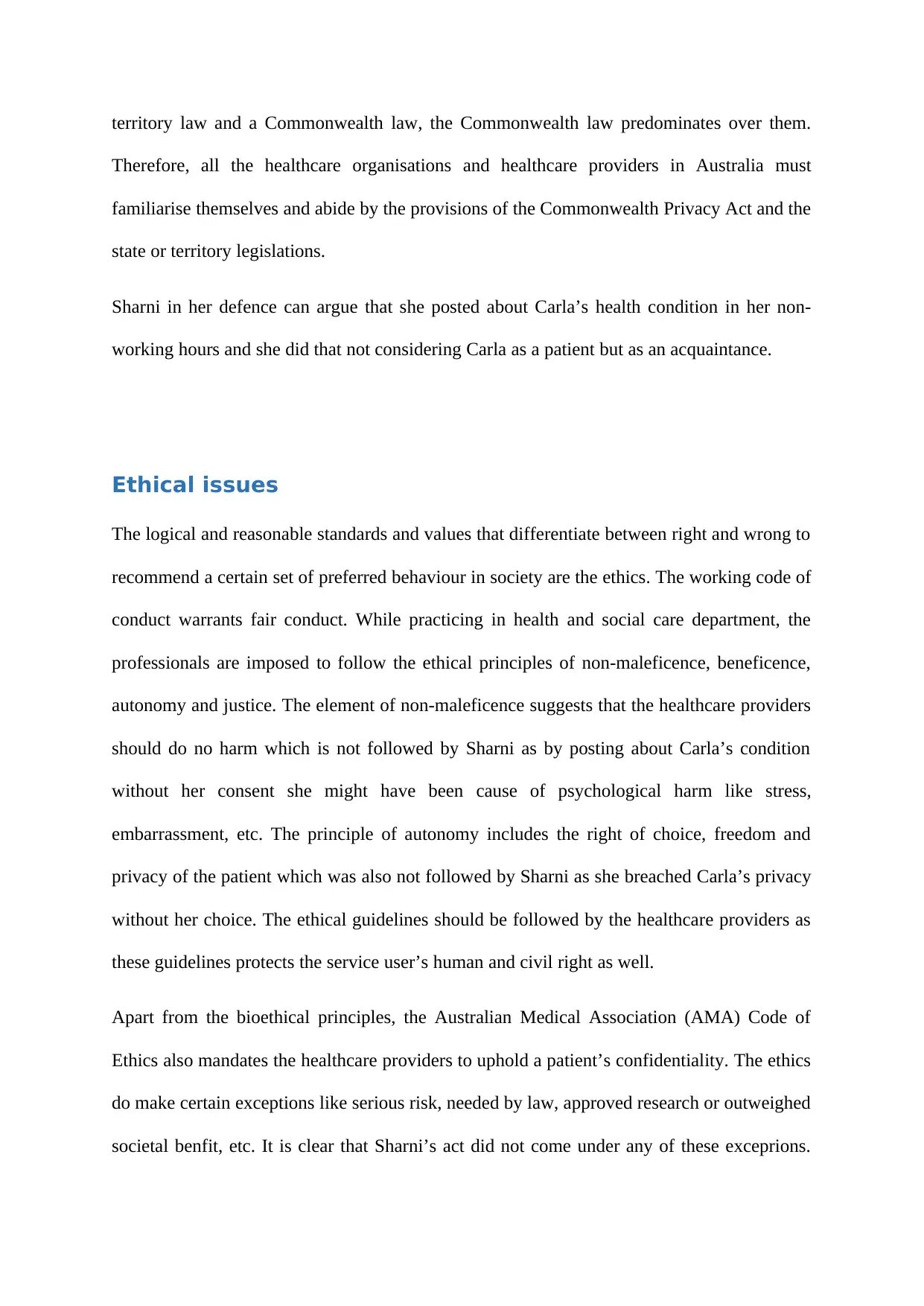
territory law and a Commonwealth law, the Commonwealth law predominates over them.
Therefore, all the healthcare organisations and healthcare providers in Australia must
familiarise themselves and abide by the provisions of the Commonwealth Privacy Act and the
state or territory legislations.
Sharni in her defence can argue that she posted about Carla’s health condition in her non-
working hours and she did that not considering Carla as a patient but as an acquaintance.
Ethical issues
The logical and reasonable standards and values that differentiate between right and wrong to
recommend a certain set of preferred behaviour in society are the ethics. The working code of
conduct warrants fair conduct. While practicing in health and social care department, the
professionals are imposed to follow the ethical principles of non-maleficence, beneficence,
autonomy and justice. The element of non-maleficence suggests that the healthcare providers
should do no harm which is not followed by Sharni as by posting about Carla’s condition
without her consent she might have been cause of psychological harm like stress,
embarrassment, etc. The principle of autonomy includes the right of choice, freedom and
privacy of the patient which was also not followed by Sharni as she breached Carla’s privacy
without her choice. The ethical guidelines should be followed by the healthcare providers as
these guidelines protects the service user’s human and civil right as well.
Apart from the bioethical principles, the Australian Medical Association (AMA) Code of
Ethics also mandates the healthcare providers to uphold a patient’s confidentiality. The ethics
do make certain exceptions like serious risk, needed by law, approved research or outweighed
societal benfit, etc. It is clear that Sharni’s act did not come under any of these exceprions.
Therefore, all the healthcare organisations and healthcare providers in Australia must
familiarise themselves and abide by the provisions of the Commonwealth Privacy Act and the
state or territory legislations.
Sharni in her defence can argue that she posted about Carla’s health condition in her non-
working hours and she did that not considering Carla as a patient but as an acquaintance.
Ethical issues
The logical and reasonable standards and values that differentiate between right and wrong to
recommend a certain set of preferred behaviour in society are the ethics. The working code of
conduct warrants fair conduct. While practicing in health and social care department, the
professionals are imposed to follow the ethical principles of non-maleficence, beneficence,
autonomy and justice. The element of non-maleficence suggests that the healthcare providers
should do no harm which is not followed by Sharni as by posting about Carla’s condition
without her consent she might have been cause of psychological harm like stress,
embarrassment, etc. The principle of autonomy includes the right of choice, freedom and
privacy of the patient which was also not followed by Sharni as she breached Carla’s privacy
without her choice. The ethical guidelines should be followed by the healthcare providers as
these guidelines protects the service user’s human and civil right as well.
Apart from the bioethical principles, the Australian Medical Association (AMA) Code of
Ethics also mandates the healthcare providers to uphold a patient’s confidentiality. The ethics
do make certain exceptions like serious risk, needed by law, approved research or outweighed
societal benfit, etc. It is clear that Sharni’s act did not come under any of these exceprions.
Paraphrase This Document
Need a fresh take? Get an instant paraphrase of this document with our AI Paraphraser
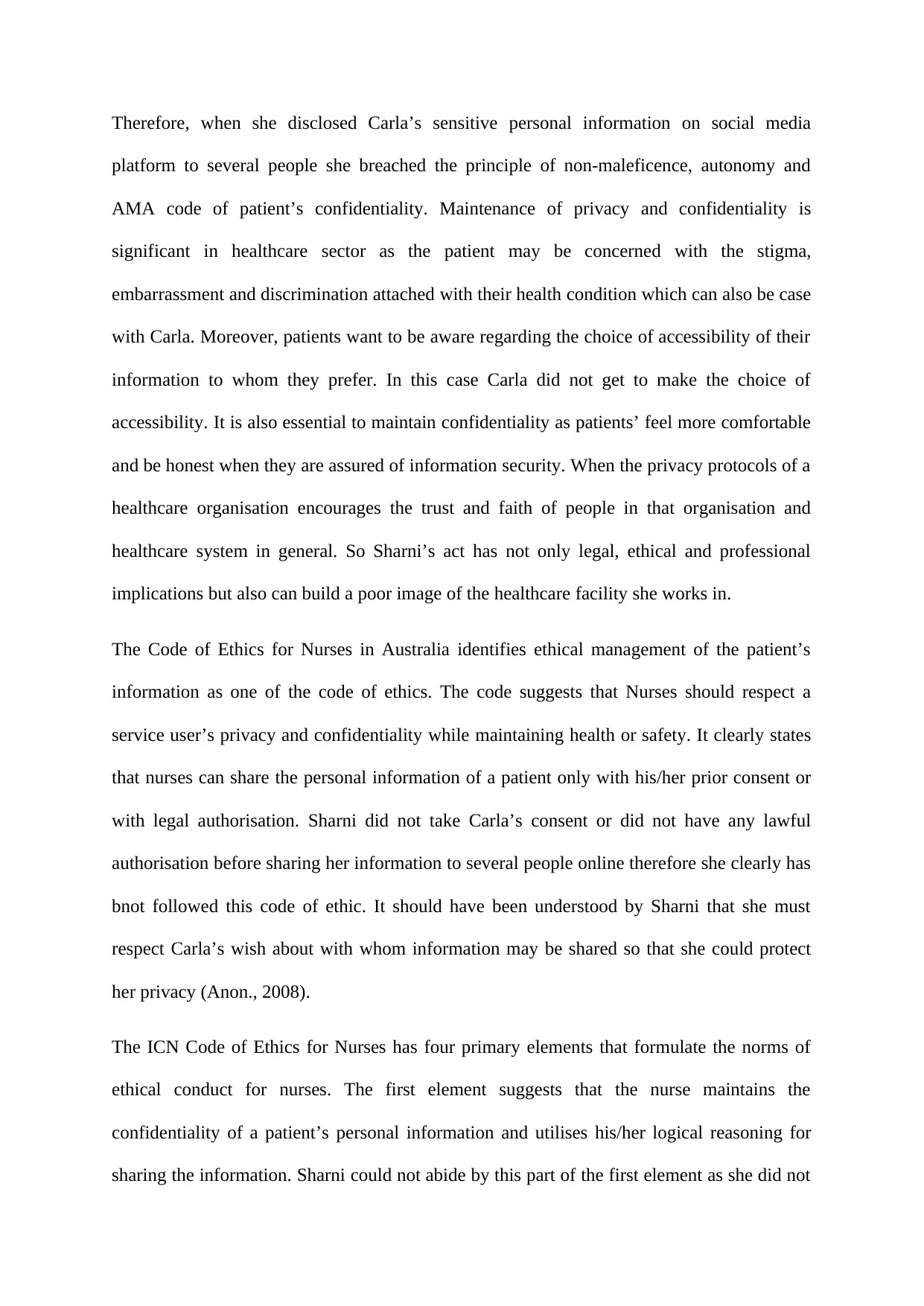
Therefore, when she disclosed Carla’s sensitive personal information on social media
platform to several people she breached the principle of non-maleficence, autonomy and
AMA code of patient’s confidentiality. Maintenance of privacy and confidentiality is
significant in healthcare sector as the patient may be concerned with the stigma,
embarrassment and discrimination attached with their health condition which can also be case
with Carla. Moreover, patients want to be aware regarding the choice of accessibility of their
information to whom they prefer. In this case Carla did not get to make the choice of
accessibility. It is also essential to maintain confidentiality as patients’ feel more comfortable
and be honest when they are assured of information security. When the privacy protocols of a
healthcare organisation encourages the trust and faith of people in that organisation and
healthcare system in general. So Sharni’s act has not only legal, ethical and professional
implications but also can build a poor image of the healthcare facility she works in.
The Code of Ethics for Nurses in Australia identifies ethical management of the patient’s
information as one of the code of ethics. The code suggests that Nurses should respect a
service user’s privacy and confidentiality while maintaining health or safety. It clearly states
that nurses can share the personal information of a patient only with his/her prior consent or
with legal authorisation. Sharni did not take Carla’s consent or did not have any lawful
authorisation before sharing her information to several people online therefore she clearly has
bnot followed this code of ethic. It should have been understood by Sharni that she must
respect Carla’s wish about with whom information may be shared so that she could protect
her privacy (Anon., 2008).
The ICN Code of Ethics for Nurses has four primary elements that formulate the norms of
ethical conduct for nurses. The first element suggests that the nurse maintains the
confidentiality of a patient’s personal information and utilises his/her logical reasoning for
sharing the information. Sharni could not abide by this part of the first element as she did not
platform to several people she breached the principle of non-maleficence, autonomy and
AMA code of patient’s confidentiality. Maintenance of privacy and confidentiality is
significant in healthcare sector as the patient may be concerned with the stigma,
embarrassment and discrimination attached with their health condition which can also be case
with Carla. Moreover, patients want to be aware regarding the choice of accessibility of their
information to whom they prefer. In this case Carla did not get to make the choice of
accessibility. It is also essential to maintain confidentiality as patients’ feel more comfortable
and be honest when they are assured of information security. When the privacy protocols of a
healthcare organisation encourages the trust and faith of people in that organisation and
healthcare system in general. So Sharni’s act has not only legal, ethical and professional
implications but also can build a poor image of the healthcare facility she works in.
The Code of Ethics for Nurses in Australia identifies ethical management of the patient’s
information as one of the code of ethics. The code suggests that Nurses should respect a
service user’s privacy and confidentiality while maintaining health or safety. It clearly states
that nurses can share the personal information of a patient only with his/her prior consent or
with legal authorisation. Sharni did not take Carla’s consent or did not have any lawful
authorisation before sharing her information to several people online therefore she clearly has
bnot followed this code of ethic. It should have been understood by Sharni that she must
respect Carla’s wish about with whom information may be shared so that she could protect
her privacy (Anon., 2008).
The ICN Code of Ethics for Nurses has four primary elements that formulate the norms of
ethical conduct for nurses. The first element suggests that the nurse maintains the
confidentiality of a patient’s personal information and utilises his/her logical reasoning for
sharing the information. Sharni could not abide by this part of the first element as she did not
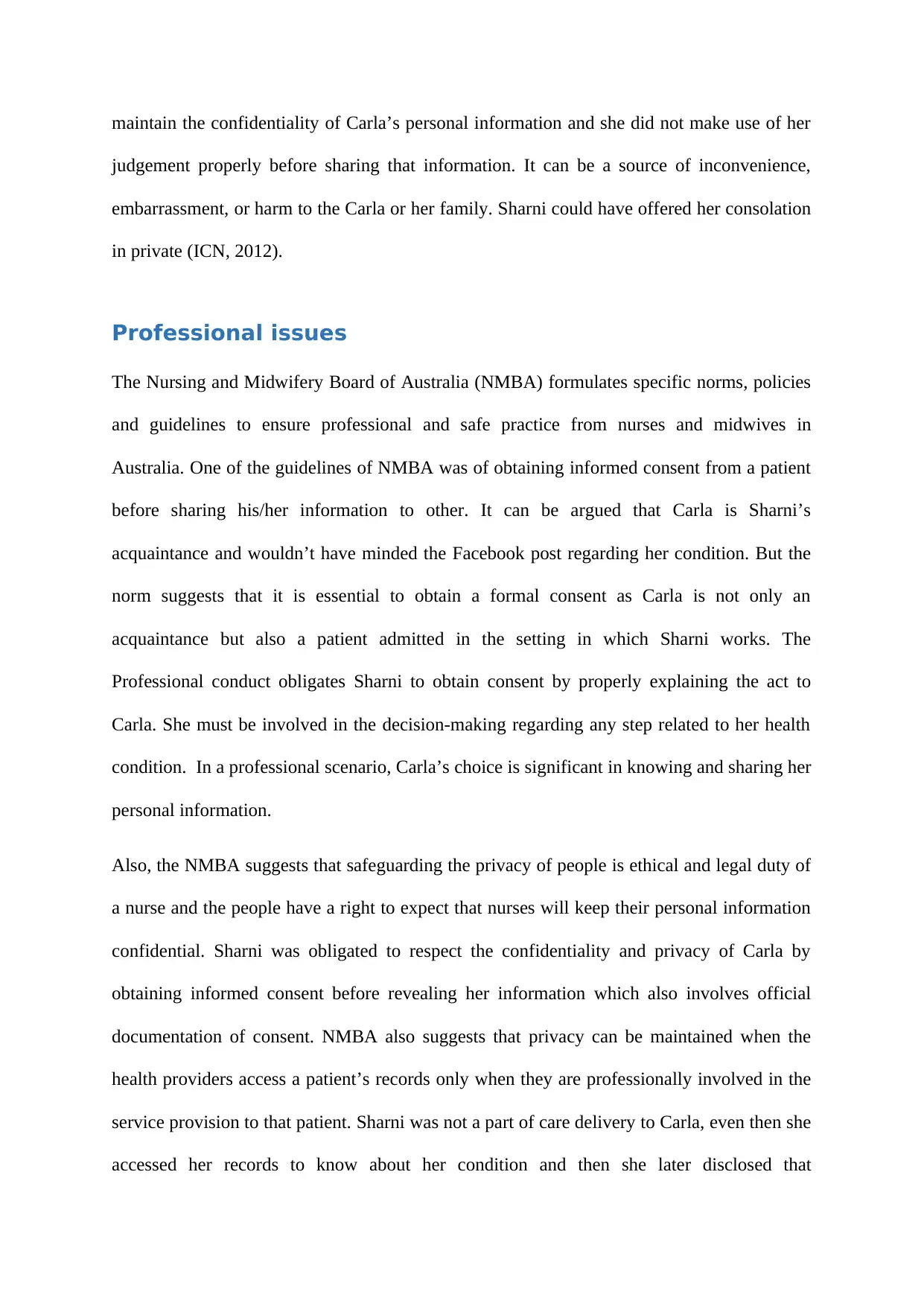
maintain the confidentiality of Carla’s personal information and she did not make use of her
judgement properly before sharing that information. It can be a source of inconvenience,
embarrassment, or harm to the Carla or her family. Sharni could have offered her consolation
in private (ICN, 2012).
Professional issues
The Nursing and Midwifery Board of Australia (NMBA) formulates specific norms, policies
and guidelines to ensure professional and safe practice from nurses and midwives in
Australia. One of the guidelines of NMBA was of obtaining informed consent from a patient
before sharing his/her information to other. It can be argued that Carla is Sharni’s
acquaintance and wouldn’t have minded the Facebook post regarding her condition. But the
norm suggests that it is essential to obtain a formal consent as Carla is not only an
acquaintance but also a patient admitted in the setting in which Sharni works. The
Professional conduct obligates Sharni to obtain consent by properly explaining the act to
Carla. She must be involved in the decision-making regarding any step related to her health
condition. In a professional scenario, Carla’s choice is significant in knowing and sharing her
personal information.
Also, the NMBA suggests that safeguarding the privacy of people is ethical and legal duty of
a nurse and the people have a right to expect that nurses will keep their personal information
confidential. Sharni was obligated to respect the confidentiality and privacy of Carla by
obtaining informed consent before revealing her information which also involves official
documentation of consent. NMBA also suggests that privacy can be maintained when the
health providers access a patient’s records only when they are professionally involved in the
service provision to that patient. Sharni was not a part of care delivery to Carla, even then she
accessed her records to know about her condition and then she later disclosed that
judgement properly before sharing that information. It can be a source of inconvenience,
embarrassment, or harm to the Carla or her family. Sharni could have offered her consolation
in private (ICN, 2012).
Professional issues
The Nursing and Midwifery Board of Australia (NMBA) formulates specific norms, policies
and guidelines to ensure professional and safe practice from nurses and midwives in
Australia. One of the guidelines of NMBA was of obtaining informed consent from a patient
before sharing his/her information to other. It can be argued that Carla is Sharni’s
acquaintance and wouldn’t have minded the Facebook post regarding her condition. But the
norm suggests that it is essential to obtain a formal consent as Carla is not only an
acquaintance but also a patient admitted in the setting in which Sharni works. The
Professional conduct obligates Sharni to obtain consent by properly explaining the act to
Carla. She must be involved in the decision-making regarding any step related to her health
condition. In a professional scenario, Carla’s choice is significant in knowing and sharing her
personal information.
Also, the NMBA suggests that safeguarding the privacy of people is ethical and legal duty of
a nurse and the people have a right to expect that nurses will keep their personal information
confidential. Sharni was obligated to respect the confidentiality and privacy of Carla by
obtaining informed consent before revealing her information which also involves official
documentation of consent. NMBA also suggests that privacy can be maintained when the
health providers access a patient’s records only when they are professionally involved in the
service provision to that patient. Sharni was not a part of care delivery to Carla, even then she
accessed her records to know about her condition and then she later disclosed that
⊘ This is a preview!⊘
Do you want full access?
Subscribe today to unlock all pages.

Trusted by 1+ million students worldwide
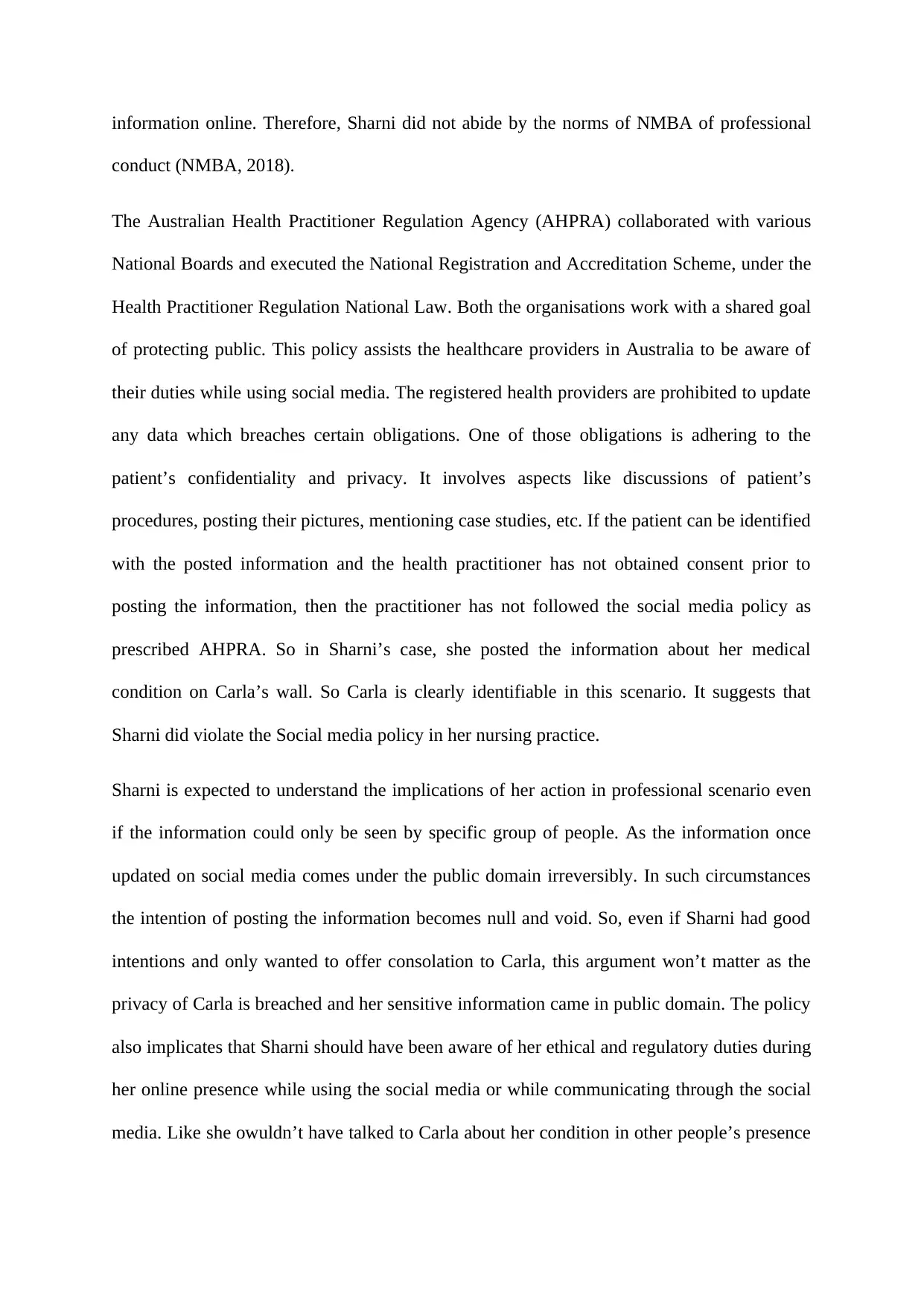
information online. Therefore, Sharni did not abide by the norms of NMBA of professional
conduct (NMBA, 2018).
The Australian Health Practitioner Regulation Agency (AHPRA) collaborated with various
National Boards and executed the National Registration and Accreditation Scheme, under the
Health Practitioner Regulation National Law. Both the organisations work with a shared goal
of protecting public. This policy assists the healthcare providers in Australia to be aware of
their duties while using social media. The registered health providers are prohibited to update
any data which breaches certain obligations. One of those obligations is adhering to the
patient’s confidentiality and privacy. It involves aspects like discussions of patient’s
procedures, posting their pictures, mentioning case studies, etc. If the patient can be identified
with the posted information and the health practitioner has not obtained consent prior to
posting the information, then the practitioner has not followed the social media policy as
prescribed AHPRA. So in Sharni’s case, she posted the information about her medical
condition on Carla’s wall. So Carla is clearly identifiable in this scenario. It suggests that
Sharni did violate the Social media policy in her nursing practice.
Sharni is expected to understand the implications of her action in professional scenario even
if the information could only be seen by specific group of people. As the information once
updated on social media comes under the public domain irreversibly. In such circumstances
the intention of posting the information becomes null and void. So, even if Sharni had good
intentions and only wanted to offer consolation to Carla, this argument won’t matter as the
privacy of Carla is breached and her sensitive information came in public domain. The policy
also implicates that Sharni should have been aware of her ethical and regulatory duties during
her online presence while using the social media or while communicating through the social
media. Like she owuldn’t have talked to Carla about her condition in other people’s presence
conduct (NMBA, 2018).
The Australian Health Practitioner Regulation Agency (AHPRA) collaborated with various
National Boards and executed the National Registration and Accreditation Scheme, under the
Health Practitioner Regulation National Law. Both the organisations work with a shared goal
of protecting public. This policy assists the healthcare providers in Australia to be aware of
their duties while using social media. The registered health providers are prohibited to update
any data which breaches certain obligations. One of those obligations is adhering to the
patient’s confidentiality and privacy. It involves aspects like discussions of patient’s
procedures, posting their pictures, mentioning case studies, etc. If the patient can be identified
with the posted information and the health practitioner has not obtained consent prior to
posting the information, then the practitioner has not followed the social media policy as
prescribed AHPRA. So in Sharni’s case, she posted the information about her medical
condition on Carla’s wall. So Carla is clearly identifiable in this scenario. It suggests that
Sharni did violate the Social media policy in her nursing practice.
Sharni is expected to understand the implications of her action in professional scenario even
if the information could only be seen by specific group of people. As the information once
updated on social media comes under the public domain irreversibly. In such circumstances
the intention of posting the information becomes null and void. So, even if Sharni had good
intentions and only wanted to offer consolation to Carla, this argument won’t matter as the
privacy of Carla is breached and her sensitive information came in public domain. The policy
also implicates that Sharni should have been aware of her ethical and regulatory duties during
her online presence while using the social media or while communicating through the social
media. Like she owuldn’t have talked to Carla about her condition in other people’s presence
Paraphrase This Document
Need a fresh take? Get an instant paraphrase of this document with our AI Paraphraser
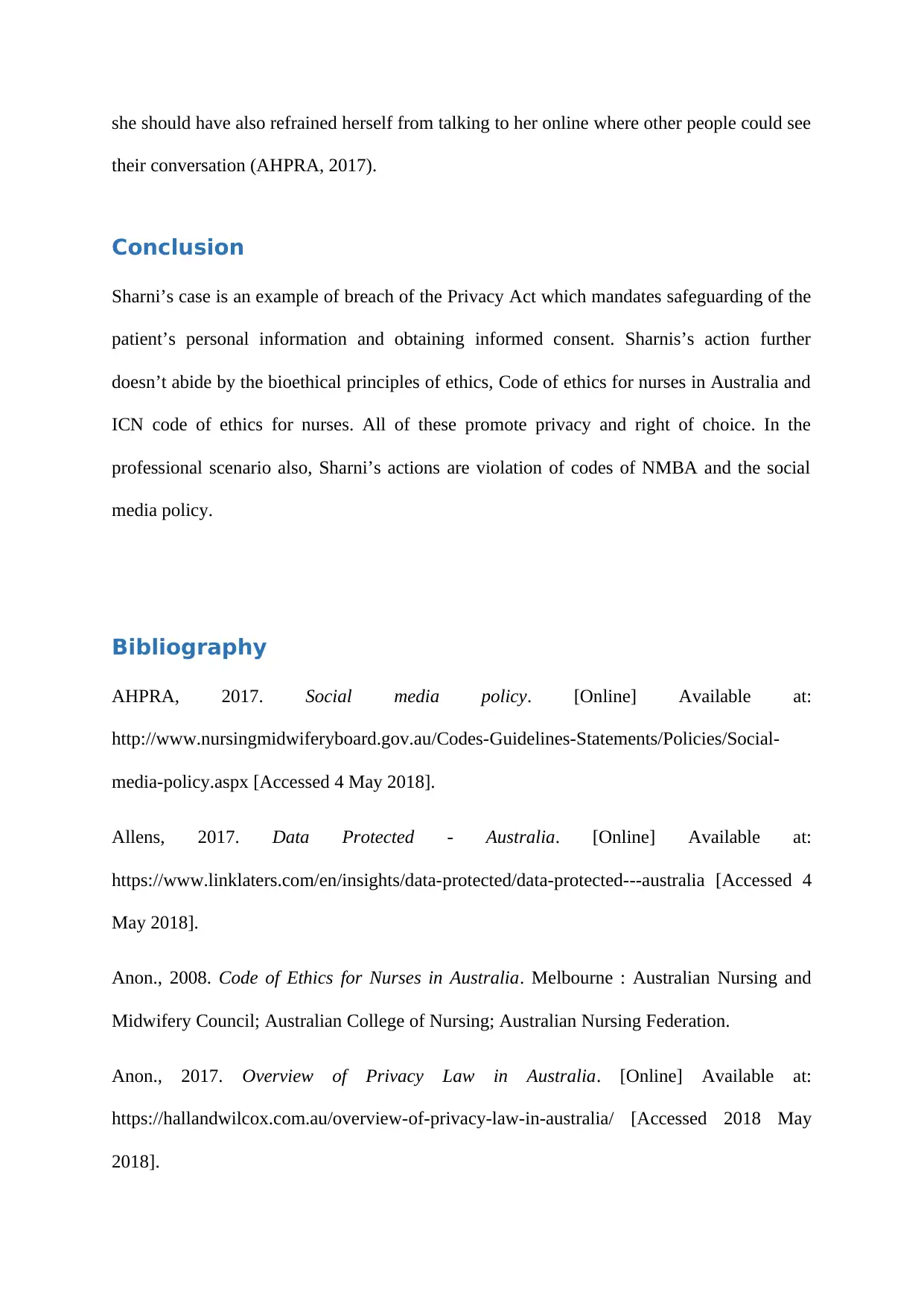
she should have also refrained herself from talking to her online where other people could see
their conversation (AHPRA, 2017).
Conclusion
Sharni’s case is an example of breach of the Privacy Act which mandates safeguarding of the
patient’s personal information and obtaining informed consent. Sharnis’s action further
doesn’t abide by the bioethical principles of ethics, Code of ethics for nurses in Australia and
ICN code of ethics for nurses. All of these promote privacy and right of choice. In the
professional scenario also, Sharni’s actions are violation of codes of NMBA and the social
media policy.
Bibliography
AHPRA, 2017. Social media policy. [Online] Available at:
http://www.nursingmidwiferyboard.gov.au/Codes-Guidelines-Statements/Policies/Social-
media-policy.aspx [Accessed 4 May 2018].
Allens, 2017. Data Protected - Australia. [Online] Available at:
https://www.linklaters.com/en/insights/data-protected/data-protected---australia [Accessed 4
May 2018].
Anon., 2008. Code of Ethics for Nurses in Australia. Melbourne : Australian Nursing and
Midwifery Council; Australian College of Nursing; Australian Nursing Federation.
Anon., 2017. Overview of Privacy Law in Australia. [Online] Available at:
https://hallandwilcox.com.au/overview-of-privacy-law-in-australia/ [Accessed 2018 May
2018].
their conversation (AHPRA, 2017).
Conclusion
Sharni’s case is an example of breach of the Privacy Act which mandates safeguarding of the
patient’s personal information and obtaining informed consent. Sharnis’s action further
doesn’t abide by the bioethical principles of ethics, Code of ethics for nurses in Australia and
ICN code of ethics for nurses. All of these promote privacy and right of choice. In the
professional scenario also, Sharni’s actions are violation of codes of NMBA and the social
media policy.
Bibliography
AHPRA, 2017. Social media policy. [Online] Available at:
http://www.nursingmidwiferyboard.gov.au/Codes-Guidelines-Statements/Policies/Social-
media-policy.aspx [Accessed 4 May 2018].
Allens, 2017. Data Protected - Australia. [Online] Available at:
https://www.linklaters.com/en/insights/data-protected/data-protected---australia [Accessed 4
May 2018].
Anon., 2008. Code of Ethics for Nurses in Australia. Melbourne : Australian Nursing and
Midwifery Council; Australian College of Nursing; Australian Nursing Federation.
Anon., 2017. Overview of Privacy Law in Australia. [Online] Available at:
https://hallandwilcox.com.au/overview-of-privacy-law-in-australia/ [Accessed 2018 May
2018].
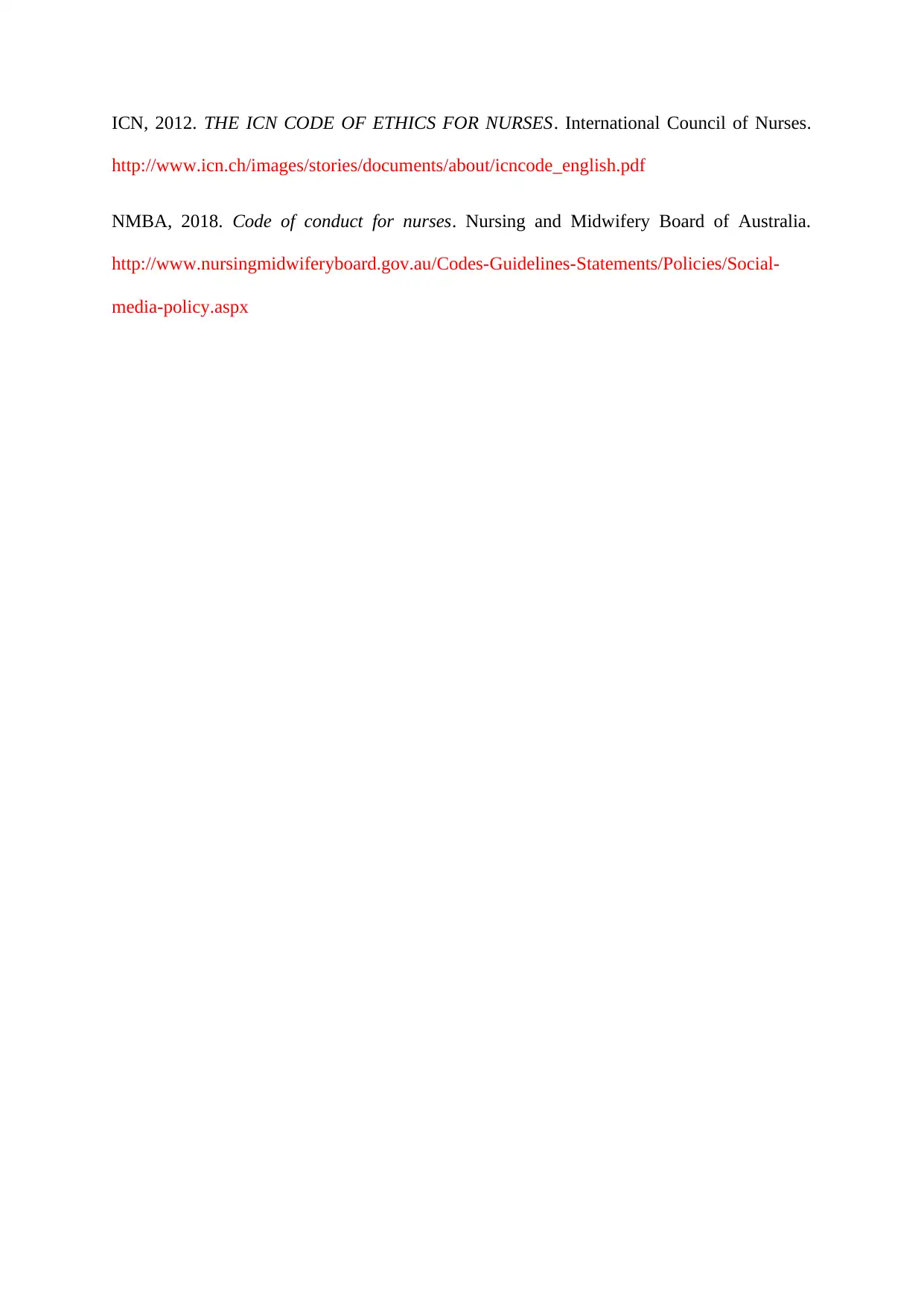
ICN, 2012. THE ICN CODE OF ETHICS FOR NURSES. International Council of Nurses.
http://www.icn.ch/images/stories/documents/about/icncode_english.pdf
NMBA, 2018. Code of conduct for nurses. Nursing and Midwifery Board of Australia.
http://www.nursingmidwiferyboard.gov.au/Codes-Guidelines-Statements/Policies/Social-
media-policy.aspx
http://www.icn.ch/images/stories/documents/about/icncode_english.pdf
NMBA, 2018. Code of conduct for nurses. Nursing and Midwifery Board of Australia.
http://www.nursingmidwiferyboard.gov.au/Codes-Guidelines-Statements/Policies/Social-
media-policy.aspx
⊘ This is a preview!⊘
Do you want full access?
Subscribe today to unlock all pages.

Trusted by 1+ million students worldwide
1 out of 9
Related Documents
Your All-in-One AI-Powered Toolkit for Academic Success.
+13062052269
info@desklib.com
Available 24*7 on WhatsApp / Email
![[object Object]](/_next/static/media/star-bottom.7253800d.svg)
Unlock your academic potential
Copyright © 2020–2026 A2Z Services. All Rights Reserved. Developed and managed by ZUCOL.





